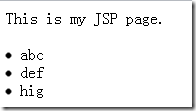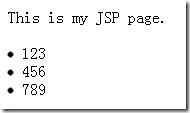Struts2与Spring整合
Struts2与Spring整合后,可以使用Spring的配置文件applicationContext.xml来描述依赖关系,在Struts2的配置文件struts.xml来使用Spring创建的bean。
1、导入依赖包
除了导入Struts2和Spring的核心库之外,还要导入commons-logging和struts2-spring-plugin包,否则启动会出异常
2、web.xml的配置
既然有Struts2,核心拦截器的配置是不可少的
<filter> <filter-name>struts2</filter-name> <filter-class>org.apache.struts2.dispatcher.FilterDispatcher</filter-class> </filter> <filter-mapping> <filter-name>struts2</filter-name> <url-pattern>/*</url-pattern> </filter-mapping>
通过配置ContextLoaderListener监听器,使容器启动时,自动加载applicationContext配置,
因为它实现了ServletContextListener这个接口,容器启动时会自动执行它实现的方法。
<listener> <listener-class>org.springframework.web.context.ContextLoaderListener</listener-class> </listener>
默认情况下,会加载WEB-INF/applicationContext.xml这个文件,我们可以通过配置contextConfigLocation参数改变配置文件的路径
<context-param> <param-name>contextConfigLocation</param-name> <param-value>WEB-INF/classes/applicationContext.xml</param-value> </context-param>
以上配置均在web.xml文件的<web-app></web-app>区域
3、测试类
在浏览器请求一个Action方法,在Action方法内向一个对象请求一个List,然后转到index.jsp页面,在页面中输出Action请求到的List。
通过Spring依赖配置,控制Action请求的对象。
首先要编写一个接口,Action方法依赖这个接口,通过调用接口中的方法获取List
public interface IocTestInterface { public List getList(); }
下面编写Action类,这个类继承ActionSupport类,并覆盖其中的execute方法,
execute方法执行时,调用实现了上述接口对象的getList方法获取List
public class IocAction extends ActionSupport { private IocTestInterface iti; private List list; public List getList() { return list; } public void setList(List list) { this.list = list; } public IocTestInterface getIti() { return iti; } public void setIti(IocTestInterface iti) { this.iti = iti; } public String execute() throws Exception { this.setList(iti.getList()); return super.execute(); } }
编写用来显示运行结果的jsp文件
遍历list,并将每个元素作为一行来显示
<%@ page language="java" import="java.util.*" pageEncoding="ISO-8859-1"%> <%@ taglib prefix="s" uri="/struts-tags" %> <!DOCTYPE HTML PUBLIC "-//W3C//DTD HTML 4.01 Transitional//EN"> <html> <body> This is my JSP page. <br><br> <s:iterator value="list" id="current"> <li><s:property value="current"/></li> </s:iterator> </body> </html>
系统的结构就是这样。下面编写两个实现IocTestInterface接口的类,用来提供数据
public class IocTestImpl implements IocTestInterface { public List getList() { List l = new ArrayList(); l.add("abc"); l.add("def"); l.add("hig"); return l; } }
public class IocTest2Impl implements IocTestInterface { public List getList() { List l = new ArrayList(); l.add("123"); l.add("456"); l.add("789"); return l; } }
4、编写applicationContext.xml配置依赖关系
<beans xmlns ="http://www.springframework.org/schema/beans" xmlns:xsi ="http://www.w3.org/2001/XMLSchema-instance" xsi:schemaLocation ="http://www.springframework.org/schema/beans http://www.springframework.org/schema/beans/spring-beans-2.0.xsd"> <bean name="IocAction" class="sy.struts2.ioc.IocAction"> <property name="iti"> <bean class="sy.struts2.ioc.IocTestImpl"></bean> </property> </bean> </beans>
文件配置了id为IocAction的bean,路径为刚刚编写的Action类的路径,其中iti对象(请求数据的对象)配置为IocTestImpl(这里使用了匿名bean)
5、编写struts.xml配置文件
首先要告知Struts 2运行时使用Spring来创建对象
在<struts></struts>区域加入以下配置
<constant name="struts.objectFactory" value="spring" />
创建package并配置Action
<package name="hs" extends="struts-default"> <action name="ioc" class="IocAction"> <result>/index.jsp</result> </action> </package>
6、发布并运行
发布后启动Tomcat,用浏览器打开地址http://localhost:8080/StrutsIoc/ioc.action,获得了下面的页面
修改spring配置文件applicationContext.xml中配置
<bean name="IocAction" class="sy.struts2.ioc.IocAction"> <property name="iti"> <bean class="sy.struts2.ioc.IocTest2Impl"></bean> </property> </bean>
只是将注入到IocAction中的IocTestImpl修改为IocTest2Impl,也就是使用了另一个实现了IocTestInterface接口的类
重启服务器,再次打开刚才的地址
这也就是spring的“控制反转”







